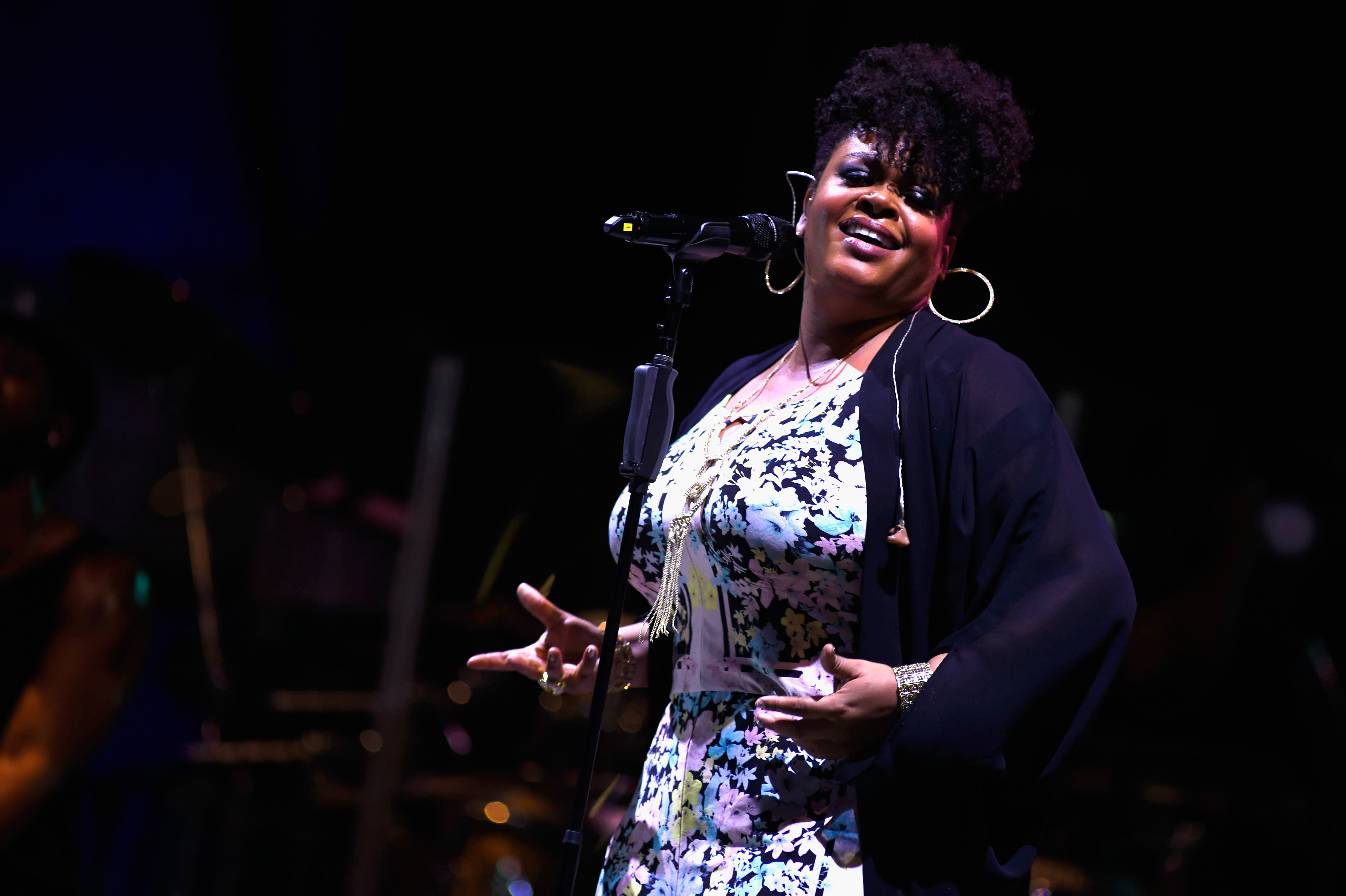We devour music at such a feverish pace that, more and more, great collections of songs fall through the cracks. Over the summer, we caught up with another punk band who’s almost as ambitious as Titus Andronicus, a critically and commercially approved R&B singer who somehow isn’t in the conversation, and a free jazz sax player known for her collages. All that plus a minor indie-pop comeback, a fast-rising Boston rapper, and the “Taylor Swift of tech-house.” Here’s the best music that SPIN missed over the last couple months.
Tenement, Predatory Headlights (Don Giovanni)
At four minutes longer than Zen Arcade with few tempos that truly thrash, this Wisconsin trio’s biggest album is no masterpiece and likely won’t prove definitive. What we get is the B-roll of some punks undergoing a maturity audit as they learn which odd chords crash together perfectly like bumper cars on “Dull Joy” and “The Shriveled Finger,” experiment with piano-plinking glam on “Curtains Closed,” buildup balladry on “Why Are We Where We Are,” and Flamin’ Groovies-style jangle-pop on “Feral Cat Tribe” — and then there’s a whole second half for weeding, too. Hint: start by chopping the nine-minute “jazz” odyssey with no takeoff; helps you get to the roughly arena-ready “I’m Your Super Glue” and the out-of-tune violins on “Hive of Hives” faster. No singles, no map provided, have fun. — DAN WEISS
Blondes, Persuasion (RVNG Intl.)
Blondes keep moving further away from the Balearic coast’s sun-dazed disco that the New York-based duo of Sam Haar and Zach Steinman once boogied to on Persuasion, their first slab of icily tribal techno since 2013’s Swisher LP (even though technically their fittingly titled remix full-length, Rewire, followed in 2014). On Persuasion, which came out in August, Blondes waste no time stripping three tracks to their most essential elements, decorating them with just scraps of tinsel. The title track overpowers the senses of rhythm with a frightened heartbeat of a pulse so much so that it’s easy to miss the minimal melody in the background; “Son” keeps a whomping pace over an eerie moan, as if from the last person on earth. “Inner Motive,” the shortest of the bunch, is also the least forgiving: the only reprieve from the underground tunnel of echoing clicks, cracks, and possibly footsteps is a whine like a fire alarm. — HARLEY BROWN
Tunde Olaniran, Transgressor (Quite Scientific)
On Tunde Olaniran’s debut LP, Transgressor, the Flint, Michigan-born musical renaissance man’s throaty tenor hits similarly rattling notes as Danny Brown’s, lands with the depth and force of Rick Rubin on Yeezus and 2005-era U.K. dubstep, and lifts you gently into the intellectual rafters — all at the same time. But, of course it is: Olaniran also works at Planned Parenthood and is an active supporter and educator of Detroit’s LGBT community. WIth this 12-track effort he strikes a beguiling balance between incongruous but interwoven sounds and political flash points, name-checking Malia Obama on the didgeridoo-driven “Up & Down” and MLK on “Everyone’s Missing,” riddled with gunshot-like percussion and morose background coos. — HARLEY BROWN
Matana Roberts, COIN COIN Chapter Three: river run thee (Constellation)
Blame her stint living on a boat in Brooklyn’s Sheepshead Bay maybe, but the third installment of Matana Roberts’ COIN COIN series skews the sunniest, melting down her rapid-fire spoken-word meditations about race and with searing saxophone blasts and sound collage. It’s the grit of troubled past, dissolved in a watery present, boiling up and over with the overjoyed liberation of an optimist’s future. Free jazz has never been quite so free. — COLIN JOYCE
Public Enemy, Man Plans God Laughs (Spitdigital)
The first thing you notice is the skeletal settings. Maybe Public Enemy figured with Kendrick’s dense attack they could switch lanes and pare down, maybe they just haven’t talked to the Bomb Squad in years. But the blunt-tipped guitar chop on the title tune, glassy music boxes and slurping synths of “Give Peace a Damn,” and the more-Stones-than-country “Honky Tonk Rules” are all genuine surprises that no other legacy act is giving up. Only one song’s over three minutes so you’ll remember all the big lines after the record’s over too: “Be the change you want to see,” “Guess who’s coming to dinner / The same folks who fix your dinner,” and Chuck D’s most important admonishment in years: “It’s cool to be black until it’s time to be black.” All this before the back-to-back “Corplantationopoly” and “Earthizen,” beats circa 2015 that funk and bump nervously like AmeriKKKa’s Most Wanted. — DAN WEISS
Cousin Stizz, Suffolk County (self-released)
Boston-born rapper Cousin Stizz is a hell of a salesman. He says about as much throughout his June tape, detailing youthful days dealing in the Massachusetts county he calls home, but the real triumph is transforming grim realities into horns-blaring self-affirmations. Part of that’s due to the sloganeering that made “Shoutout” a low-key hit last year (even Drake was a fan), but there’s this way that Stizz dances over the foreboding beats like he’s playing hopscotch, taking the Future path of transforming “dirty work” into radio-ready anthems. — COLIN JOYCE
Jill Scott, Woman (Atlantic)
“I’ve been eating more greens,” Scott sings over stately “Bennie and the Jets” piano on “Prepared,” one of the most fortuitous get-my-s–t-together songs in recent memory, before adding the ultimate around-the-way-girl touch: “I’ve been getting recipes off the Internet.” But she also longs to indulge her “wild cookie choices” even when they “lead to pregnancy,” and, on the very best track, lists all of the breakfast foods she’s no longer going to cook for that ex again forever-ever, forever-ever. (Is she dumping Ron Swanson?) One who knows food knows life, and underrate her though you might, the Delaware Valley philanthropist and plus-size lingerie entrepreneur has scored two number-one albums (on yes, the 200, not the R&B chart) in the 2010s to beat her two top-fivers in the 2000s. “Run Run Run,” “Can’t Wait,” and “Coming to You” finally rock as hard on record as her earth-shattering appearance in Dave Chappelle’s Block Party. But she’s never more at home than when BJ the Chicago Kid accepts an offer of her “chocolate covered honey” on the closing “Beautiful Love.” — DAN WEISS
Zachary Cale, Duskland (No Quarter)
A perpetually undersung songwriter, Brooklyn-based singer Zachary Cale spins reliable, gentle allegories with varied but minimal instrumentation that’s varied little over the course of his young but four-disc career (2013’s elegiac-like Blue Rider was arguably his breakout). There’s always an acoustic guitar, usually a tambourine, sometimes a drum machine or live drums — and Cale’s own wispy mumble of a voice, which has rightfully been compared to Cass McCombs. On Duskland, he veers slightly more into homegrown Kurt Vile territory, especially with the organ-saturated opener “Sundowner.” — HARLEY BROWN
Félicia Atkinson, A Readymade Ceremony (Shelter Press)
Like her pieces themselves, Félicia Atkinson’s stated influences on A Readymade Ceremony skew spectral, serpentine, and surreal. The French experimental composer has said that she drew on the high-minded works of authors from her homeland like George Bataille, Herni Michaux, Jean Genet, and famously boundary-pushing musicians like John Cage and Morton Feldman for her latest LP under her own name.
But even if she didn’t say so, the crushing weight of these concrète compositions point in the direction of those dreamworld overlords. The ten-and-a-half-minute “L’oiel” is a nightmarish collage of her own whispers and threatening waves of static, claustrophobic in its evocation of overwhelming anxiety — a solid case for canonization among the icons she holds so dear. — COLIN JOYCE
The Go! Team, The Scene Between (Memphis Industries)
In keeping with the pick-a-lane ethos of the 2010s, the once-eclectic Ian Parton decides samples are too expensive anyway and doubles down on “Buy Nothing Day,” the Bethany Cosentino-featuring centerpiece from 2011’s Rolling Blackouts. That is, he’s picked up Young Guv’s gauntlet and made the power-pop album of the year. Highlights include the opening “What D’you Say,” which sounds like neo-psychedelic Belle & Sebastian, the clappy Apples in Stereo redux “Catch Me on the Rebound,” and the gorgeous, anthemic “The Art of Getting By (Song for Heaven’s Gate),” which sounds like the Go! Team and no one else. — DAN WEISS
Kolsch, 1983 (Kompakt)
Danish producer Kolsch can whip big rooms into a frenzied cloud of condensation with tracks like his blasphemously bangin’ remix of Paul Kalkbrenner’s Jefferson Airplane-sampling “Feed Your Head,” but he saves his subtler side for full-length releases. June’s 1983, the follow-up to 2013’s 1977 (just call him the Taylor Swift of tech-house), couches temperature-raising BPMs in evocative strings, like the literally and emotionally moving “The Road” or baroque house jam “Cassiopeia,” both featuring multi-instrumentalist Gregor Schwellenbach. The album’s others — all of them, except for the title track and album opener, remarkably stick to five minutes — like the skittering, piston-punctuated “Pacer,” rise to the occasion of possibly even bigger stages. — HARLEY BROWN
Bilal, In Another Life (eOne Music / Purpose)
This mild, weirdo formalist has been around since well before his star turns on To Pimp a Butterfly and his well-aged craft shows on his fourth LP in 15 years. In Another Life opens with the same beat Jay Z jacked for “Picasso Baby” and ascends to blown-out-drums heaven like he’s Dungen or something, making way for the ominous harmonies of “Open Up the Door” and the Monk piano and “forever again” riddles of “I Really Don’t Care.” Then an odd thing happens and his anachronistic jazzy R&B gets even more memorable as it smooths out: the climbing melody of the single “Satellites” has some of TLC’s “Waterfalls” in it, refracted through channel ORANGE and maybe Portishead’s Dummy. And on “Pleasure Toy” he scrunches up his voice like Prince about to squeak out “You don’t have to be beautiful.” Has anyone else made an R&B album to relax to lately? — DAN WEISS

















